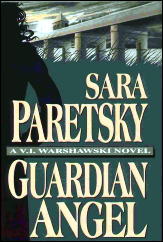Sat 12 Sep 2015
A Review by Barry Gardner: SARA PARETSKY – Guardian Angel.
Posted by Steve under Reviews[2] Comments
SARA PARETSKY – Guardian Angel. V. I. Warshawski #7. Delacorte Press, hardcover, 1992. Dell, paperback, 1993.

I have in general liked the Warshawski novels well enough, though not nearly so well as many have. Something has changed, however, at least for me, between this book and the last [and] I’ll be very interested in your viewpoint.
In brief: an old friend of her landlord, Mr. Contreras, mooches off him a few nights and while there, hints that he has something on their old employer that is going to make him wealthy. Contreras boots him out finally, and a few days later his body is found, after he had apparently fallen into a canal and drowned near the old employer’s plant.
Contreras is grief- and guilt-stricken (the dead man had been his oldest friend), and beseeches Warshawski to investigate, even though there is nothing at all to indicate foul play. There is another plot involving an eccentric neighborhood lady whose yard is overgrown and whose dogs run loose vs. a yuppie lawyer neighbor (who works for Vic’s ex”husband’s law firm) who is out to do horrible legal things to her.
Due to her success, talent, and willingness to speak out, Paretsky has become something of an icon for feminists in the field. Though I have never met the lady, from the interviews and anecdotes Ive read I think it fair to say that she shares at least some qualities with her heroine: courage, anger, and outspokenness, at a minimum.
While I’m well aware of the pitfalls in projecting a fictional character’s beliefs onto the creator, I am convinced that Paretsky admires Warshawski much in the manner that Robert Parker does his own creation, Spenser; and that, much as with Parker/Spenser, criticism of the books, or of Warshawski, is often taken by Paretsky’s admirers to be criticism of Paretsky herself.
That’s unfortunate, for while I am neither anti-feminist nor anti-Paretsky, I am becoming more and more anti-Warshawski. I can intellectually understand why someone with strong feminist sympathies would like and approve of her; I cannot see how anyone else could objectively view her as other than a prickly, neurotic, and unpleasant human being.
She acts foolishly and impulsively, often in sheer rage at being thwarted. Her respect for the law and for the rights of anyone other than those she crusades for is non-existent. She whines, moans, and perishes with endless guilt over actions that lead to unwanted con-sequences, and then repeats them in kind, ad infinitum. Intensely human, you say. Perhaps; but not a human I wish to know any better. I find Warshawski’s friends as unappealing as I find her. I think it safe to say that Paretsky and I see people differently.
I’m also tired of books with protagonists that act in ways that are absolutely asinine and unrealistic, and this was another such, though to be fair no more so than many others. I won’t take the time or space to detail the inanities, but they’re there, and you’ll find them if you read it.
Paretsky’s writing is as competent as ever, but it is an unobtrusive competency, a style that will not carry a book regardless of content. In the end, one likes or dislikes Paretsky’s books only as one likes or dislikes Warshawski’s personality, world view, and actions. In Guardian Angel, I liked none of them.
September 13th, 2015 at 1:49 am
While I disagree, I would never think of attacking any review based as obviously based on his reaction to the book and character as this as an attack on the writer as a person.
I know Paretsky a little and admire and like her, but if I see the identification with V.I. I also see the differences. I never felt like I was attacking Parker when I complained about Spenser later or for that matter Andrew Vachess when I complained about Burke. I hope everyone extended that courtesy to Barry.
I can find something wrong with a book and expect others to be able to as well, without taking shots at the writer. I hope when Barry wrote this no one treated him the way he seemed concerned they would. Even when a writer identifies intensely with a fictional character most keep a little distance if only for self protection.
September 13th, 2015 at 4:36 pm
I have read Barry’s review several times now, and I think it’s a gem of critical writing. I can sense how carefully he chose every word, but I still can admire how easily it flows.
This particular book I do not seem to have read, and that surprises me, since I thought I had read them all, save for Paretsky’s two most recent, which I will get to eventually, as time moves on.
So I do not know what triggered these comments by Barry as he put them down, but I am very much in sync with how he said it.